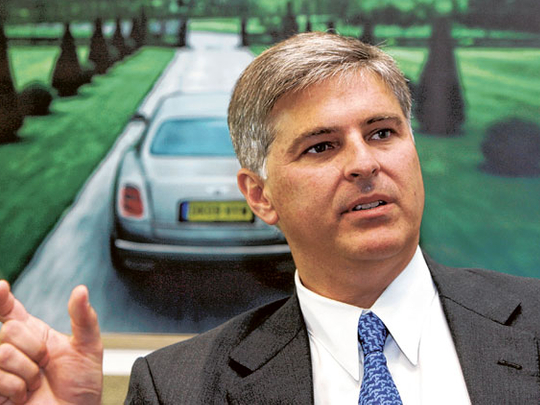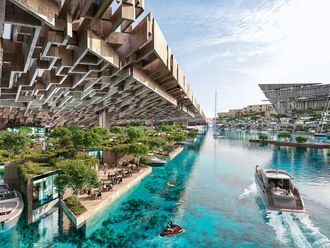
Dubai: The regional unrest might have had a dramatic impact on Hilton Worldwide's business in the Middle East, but that has not deterred Christopher J. Nassetta, the company's president and CEO, who has an aggressive expansion plan for this market.
During his visit to Dubai this week to sign a huge contract with Al Habtoor Group to manage its three properties — one in Palm Jumeirah and two in Beirut — Nassetta shared with Gulf News Hilton's plans to introduce new brands from its global portfolio to this market. The company will open a Waldorf Astoria luxury hotel in Dubai on Palm Jumeirah in late 2013 and the UAE's first one in Ras Al Khaimah in the fourth quarter of next year.
GULF NEWS: What percentage of Hilton Worldwide's total business comes out of the Middle East today? And how do you see that growing over the next few years?
Christopher J. Nassetta: Of the entire world, this region probably accounts for five per cent in terms of profitability, but obviously, growing at a very fast pace. We have a pipeline that suggests we are nearly going to double that in the next two to four years. And we don't plan on stopping.
We think the Middle East is going to be, from a percentage growth point of view, one of the strongest growth markets we have in the world. And we would like to see it represent an even larger part of our overall business as that occurs.
In terms of the number of hotels, we have 53 hotels in the Middle East out of our global total of 3,750 properties.
Dubai seems too crowded with approximately 80,000 hotel rooms today with not such high demand. Does it really need more hotel rooms? And how does that impact Hilton's plans for this market?
We intend to continue to grow and particularly in Dubai. We have had a number of limitations in terms of our other relationships in Dubai that kept our growth more muted than we'd like. The reality is that demand is picking up in Dubai for a lot of reasons — the world economy has stabilised post 2008-2009 declines. There are things going on in other parts of the Middle East and northern Africa that have probably helped Dubai in this part of the world in terms of shifting demand out of places that are more disrupted at the moment, into this market.
At the same time you have a significant drop in the construction of new hotels. Compared to even three or four years ago when a lot of hotel projects were getting started and under construction in Dubai, it's very different today, and that's for a lot of reasons. For instance, the macro environment got more challenging — no banks are lending so there are very few projects that are starting.
Thus, with the supply bases here and a more moderate expectation of additional supply growth, combined with increasing demand growth for macro and micro reasons in this region, we feel very good about our business here and do absolutely intend to grow.
So you are not of the opinion that the Dubai hotel market is saturated yet?
No. I am not. Hotel markets have been doing this for 30 years — they go up and down and it's the laws of economics that drive supply and demand.
There is no question that there was a time a few years ago where probably supply was getting ahead of demand, but I would say today that with the limitations on new supply and demand, I think it's strong and continues to grow. I think this market will be a very healthy long-term market. In the long term, Dubai is going to continue to get demand from both inside the Middle East and the western world, particularly, Europe. So, it's very important here that we have representation from all of our upper upscale, luxury brands such as Waldorf Astoria and Conrad in the luxury space and Hilton, DoubleTree in the upper upscale space.
Five of Hilton's global portfolio of 10 brands have a presence in this market today. How soon do you expect to bring all the brands to this market?
I think for the moment our plan in the short to medium term is to continue to exploit the growth in our existing five brands in the region — Hilton, DoubleTree, Waldorf Astoria, Conrad and Hilton Garden Inn. Obviously, luxury hotels would be much more selective as we would only want those in the best destinations where the demand supports it. You will see more volume of growth in the Hilton and DoubleTree brands.
There is an opportunity to bring our Hilton Garden Inn brand — that is active just in Riyadh at the moment — to the UAE. It is an upscale brand with somewhat lower price point than that of Hilton or DoubleTree. We do think that as the market matures and evolves, there would be an opportunity in this market [UAE] for Hilton Garden Inn, and we may even be working on some things.
As for the other five brands, there would probably be a time but we don't think that the market demand base suggests today that we should explore those. These are our midscale segment brands, such as Hampton Inn, Extended Stay, Homewood Suites, Home 2, Hilton Garden Vacations. There may be opportunities but I think we have got plenty to do with the existing five [brands]. And keeping in mind the demand base that exists today in the Middle East we are best served building our platforms for those brands.
How badly was Hilton's revenue hit by the geo-political unrest in the region?
The big impact has been in Egypt where Hilton has a large presence with 18 properties. There has been a dramatic impact on the revenues and profitability of the hotels in Cairo although they have, more recently, been coming back. But while the business is coming back it's still not where it needs to be.
As for the resorts that we operate throughout Egypt, they are getting back on track from the occupancy point of view. Our expectation is that next year, the resorts will be plus or minus back to where they used to be.
For Cairo, I think it depends on the political situation. So we really can't say. But if we look at what happened in January, February and March — when we were probably running 10 per cent or less occupancy — we are a lot better off today.
In Cairo, we are currently running probably around 30-40 per cent occupancy. And before, we would have been in the 60s or the 70s or the 80s [occupancy] levels. While we are doing better than our competitors, it's still a tough situation.
Hilton Worldwide recently signed a deal with Al Habtoor Group to manage its three hotels in the region. Are you in active talks with other companies for similar deals in the Middle East?
Yes, we are talking to other players for potential tieups. We have signed 18 deals this year already in the Middle East and Africa, and you will definitely see more to come before the end of the year. There are lots more to come. But we can't reveal details of any before we sign those.
Positions held
Christopher Nassetta joined Hilton Worldwide as President and Chief Executive Officer in December 2007. Prior to that, he was the President and CEO of Host Hotels & Resorts, a position he held from 2000, having joined the company in 1995 as Executive VP. Before joining Host, Nassetta co-founded Bailey Capital Corporation in 1991, where he was responsible for the operations of the real estate investment and advisory firm. A finance graduate from the University of Virginia McIntire School of Commerce, Nassetta currently serves on various boards and organisations.












